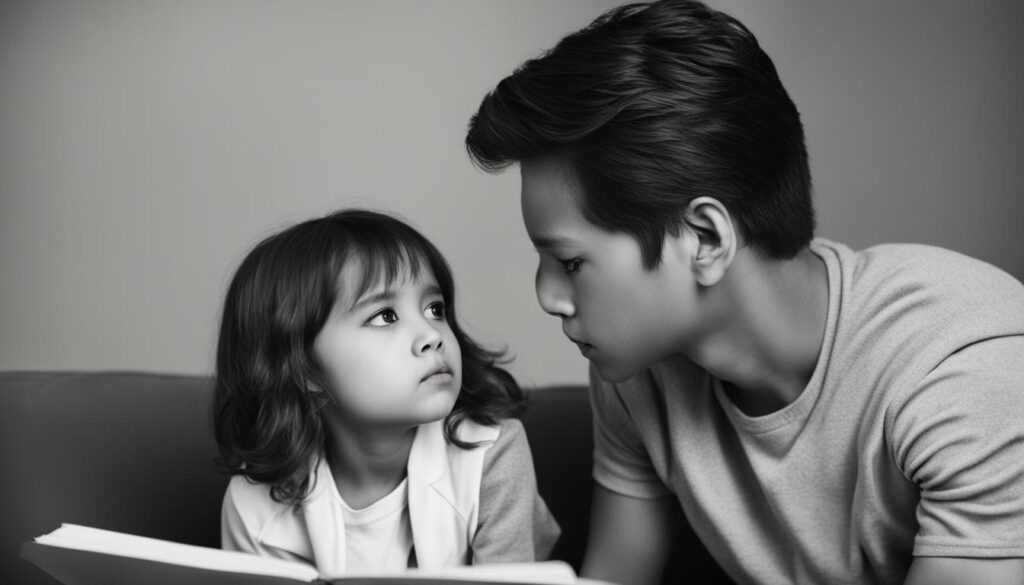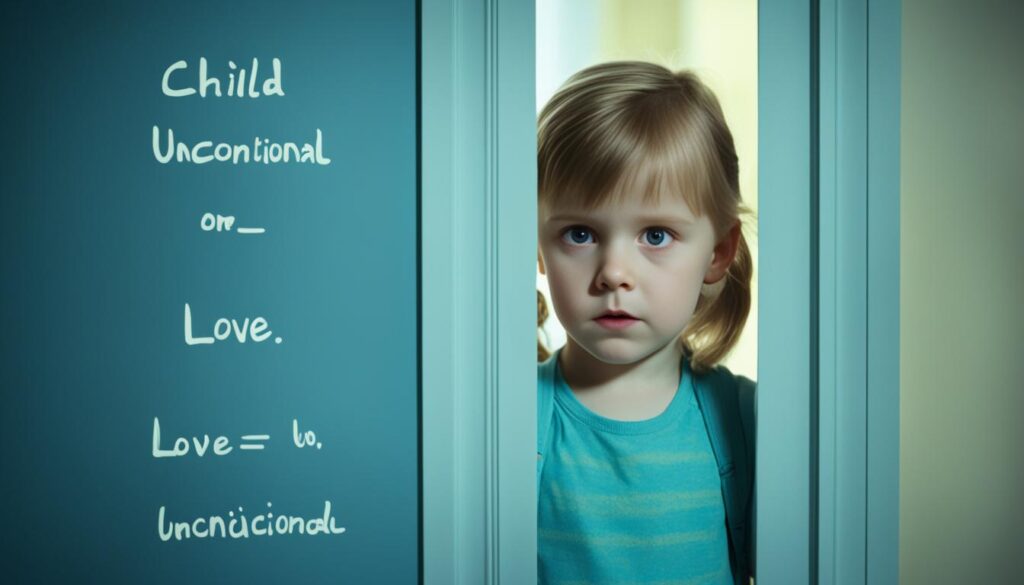“You can search throughout the entire universe for someone who is more deserving of your love and affection than you are yourself, and that person is not to be found anywhere. You, yourself, as much as anybody in the entire universe, deserve your love and affection.” – Buddha
Love from parents is meant to be unconditional and nurturing, providing a foundation for emotional well-being and healthy relationships. However, some parents may unknowingly or knowingly impose conditions on their love, creating a profound impact on their child’s self-identity and ability to form meaningful connections.
Conditional love from parents can manifest in different ways, such as constantly setting high expectations or withholding affection when those expectations aren’t met. This can lead to a constant feeling of not being good enough and a longing for acceptance. Recognizing the signs of conditional love is the first step towards overcoming its effects and finding emotional freedom.
In this article, we will explore the damaging effects of conditional love from parents, the difference between conditional and unconditional love, signs that indicate conditional love, its impact on self-identity, and practical steps to overcome it and cultivate a life of emotional freedom and fulfillment.
Key Takeaways:
- Conditional love from parents can have a profound impact on an individual’s emotional well-being.
- Understanding the difference between conditional love and unconditional love is essential in recognizing its effects.
- Signs of conditional love include feeling drained and never good enough.
- Conditional love can greatly influence an individual’s self-identity and lead to low self-esteem.
- Overcoming conditional love requires self-awareness, support, and self-care.
By recognizing and actively working towards overcoming conditional love from parents, you can embark on a journey of self-discovery, healing, and ultimately find the emotional freedom you deserve.
Understanding Conditional Love vs Unconditional Love
Conditional love from parents can have a profound impact on an individual’s emotional well-being and their ability to form nurturing relationships. It is essential to understand the difference between conditional love and unconditional love to recognize the effects of conditional love from parents.
Conditional love is when a parent sets certain expectations and only expresses love when their child meets those expectations. It is based on conditions and achievements. On the other hand, unconditional love is constant and does not rely on accomplishments or meeting specific conditions. It is a love that accepts and supports without judgment or expectations.
Understanding this distinction is crucial in comprehending the impact of conditional love from parents. It sheds light on the dynamic of their love and helps individuals navigate the effects it may have on their emotional well-being and relationships.

Conditional Love
Conditional love operates on the premise of meeting specific expectations. Parents who express conditional love set criteria for their child to earn their love and acceptance. This could include academic achievements, physical appearance, or conforming to certain behaviors.
This type of conditional love can create immense pressure on the child, leading to feelings of never being good enough and constantly striving for perfection. It hinders the development of a healthy self-esteem and can impede the formation of secure and authentic relationships.
Unconditional Love
Unconditional love, on the other hand, is characterized by acceptance and support regardless of achievements or meeting certain conditions. It is a love that is given freely and consistently, nurturing an individual’s sense of self-worth and fostering emotional well-being.
Individuals who experience unconditional love from parents are more likely to develop a strong sense of self, feel secure in their relationships, and display healthy emotional expression and vulnerability.
Recognizing the difference between conditional love and unconditional love is crucial in understanding the impact of conditional love from parents. It allows individuals to navigate their own emotional wounds and strive for healthier, more fulfilling relationships.
Signs of Conditional Love from Parents
Recognizing the signs of conditional love from parents is crucial in understanding the dynamics of family relationships and the emotional attachment between parent and child. The presence of conditional love can greatly impact the parent-child bonding and the overall well-being of the child. Here are some common signs to watch out for:
Feeling Drained and Beaten Down
One of the signs of conditional love is feeling emotionally drained and beaten down after interacting with a parent. The interactions are often filled with criticism, constant judgment, and an overall lack of support or empathy.
Never Feeling Good Enough
Children who experience conditional love often feel like they can never measure up to their parents’ expectations. They constantly strive for validation and approval, but it is never enough. This can lead to feelings of inadequacy and a constant need to prove themselves.
Rare Expressions of Pride Over Accomplishments
Parents who love their children conditionally may rarely express genuine pride or joy over their accomplishments. They may downplay achievements or fail to acknowledge them altogether. This lack of validation can leave children feeling unimportant and unseen.
Downplaying Achievements
Conditional love can manifest through parents consistently downplaying their child’s achievements. They might undermine their accomplishments, criticize their efforts, or attribute their success to external factors rather than acknowledging their hard work and talent.
Open Rejection in Front of Others
A parent who loves their child conditionally may openly reject them in front of others, whether it be through harsh words, belittlement, or disregard for their feelings. This public rejection can be deeply painful and damaging to the child’s self-esteem.
Fearing Expressing Oneself or Talking Openly
Children who experience conditional love may develop a fear of expressing their thoughts, emotions, or opinions openly. They fear judgment or rejection from their parents and may resort to suppressing their true selves or conforming to please their parents.
Recognizing these signs is the first step towards understanding and addressing conditional love from parents. It is essential to create a safe and nurturing environment where parent-child bonding can thrive, allowing children to develop a positive and healthy sense of self-worth and emotional attachment to their parents.

| Signs of Conditional Love from Parents |
|---|
| Feeling Drained and Beaten Down |
| Never Feeling Good Enough |
| Rare Expressions of Pride Over Accomplishments |
| Downplaying Achievements |
| Open Rejection in Front of Others |
| Fearing Expressing Oneself or Talking Openly |
The Impact of Conditional Love on Self-Identity
Conditional love from parents can have a profound impact on an individual’s self-identity. Growing up with the belief that something is always missing and constantly feeling inadequate can significantly affect one’s self-esteem and emotional well-being. The longing for acceptance and validation becomes a constant struggle, shaping how we perceive ourselves and our worth.
Conditional love from parents distorts our self-perception, leaving us questioning our abilities and value.
Family relationships play a crucial role in shaping our self-identity. When parental love is conditional, we internalize the idea that our worth is contingent on meeting certain expectations or conditions. We develop a constant fear of failure, striving relentlessly for approval and validation from our parents.
Conditional love creates emotional dependency and a desperate need for validation, hindering our ability to develop a strong sense of self.
The impact of conditional love on self-identity extends beyond childhood. These deeply ingrained beliefs affect our relationships, career choices, and overall well-being. Our self-image is colored by the lens of conditional love, leading to self-doubt, feelings of unworthiness, and struggling to establish healthy boundaries.
Recognizing and understanding the impact of conditional love on our self-identity is the first step towards healing and finding emotional freedom.
To further illustrate the consequences of conditional love on self-identity, here is a comparison of the characteristics and effects of conditional love and unconditional love:
| Conditional Love | Unconditional Love |
|---|---|
| Love is based on meeting expectations and conditions | Love is constant and unconditional |
| Leads to feelings of inadequacy and low self-esteem | Fosters a sense of security and self-worth |
| Creates emotional dependency and fear of rejection | Nurtures independence and healthy attachment |
| Strains relationships and hinders personal growth | Promotes nurturing relationships and self-acceptance |
Understanding the difference between conditional love and unconditional love provides clarity on the detrimental effects of conditional love from parents.
Recognizing the impact of conditional love on self-identity empowers us to break free from its grip and embark on a journey of self-discovery and acceptance. By embracing our inherent worth and cultivating unconditional self-love, we can overcome the wounds inflicted by conditional love and create a foundation for personal growth and emotional well-being.

Overcoming Conditional Love and Finding Emotional Freedom
Overcoming conditional love from parents can be a challenging but transformative journey towards finding emotional freedom. It requires self-awareness, support, self-care, and patience. It’s important to remember that you cannot change your parents or the past, but you can learn to create a nurturing environment for yourself and break free from the chains of conditional love.
One of the first steps in healing is to recognize and acknowledge the conditional love you received from your parents. This awareness can help you understand that their love was based on your achievements or meeting certain expectations, rather than being unconditional. By understanding this distinction, you can begin to let go of the feelings of not being enough or constantly seeking validation.
Building solid friendships and nurturing relationships outside of your family can be a powerful way to fill the void created by conditional love. Surrounding yourself with people who genuinely care about you, support you, and accept you unconditionally can help you experience the love and acceptance you may have missed out on in your family dynamics.
Seeking Support
Seeking support from therapists or coaches who specialize in family relationships and emotional trauma can provide valuable guidance and tools for healing. They can help you navigate through the complex emotions associated with conditional love and assist you in developing healthy coping mechanisms.
Practicing self-care habits is another crucial aspect of finding emotional freedom. Engaging in activities that bring you joy, taking time for self-reflection, and prioritizing your mental and physical well-being can help you build resilience and cultivate self-love.
Choosing positive affirmations that challenge the negative beliefs instilled by conditional love can also be a transformative practice. By consistently reminding yourself of your worthiness and embracing self-acceptance, you can gradually break free from the emotional chains that conditional love may have placed upon you.

Remember, overcoming conditional love is a journey that requires patience and self-compassion. It’s about reclaiming your power and creating a life where you can thrive emotionally. By prioritizing your own well-being, building nurturing relationships, seeking support, practicing self-care, and embracing positive affirmations, you can overcome the effects of conditional love from parents and find the emotional freedom you deserve.
Conclusion
Overcoming conditional love from parents is a transformative journey that opens the door to personal growth and emotional freedom. By understanding the difference between conditional love and unconditional love, you gain clarity on the dynamics of your parent-child relationship. Recognizing the signs of conditional love paves the way for healing and self-acceptance, allowing you to break free from the chains of unrealistic expectations.
Creating nurturing relationships and practicing self-care become essential pillars in your quest for liberation. Surround yourself with individuals who demonstrate genuine, unconditional love and support. Cultivate connections that celebrate your accomplishments, validate your emotions, and empower you to be your authentic self. Prioritizing self-care habits, such as engaging in activities that bring you joy and practicing self-compassion, strengthens your emotional well-being and reinforces your journey towards wholeness.
Remember, the path to overcoming conditional love may not be easy, but it is within your grasp. Embrace the power within you to rewrite the narrative of your life. Choose to love and accept yourself unconditionally, even in the face of past conditioning. By embracing emotional freedom and fulfilling your own potential, you pave the way for a life filled with love, authenticity, and genuine connections.
FAQ
What is conditional love from parents?
Conditional love from parents is when a parent expects perfection and only expresses love when their child meets their expectations, creating a sense of emptiness and longing for unconditional love.
How can I recognize signs of conditional love from parents?
Signs of conditional love from parents include feeling drained after interactions, never feeling good enough, rare expressions of pride, downplaying achievements, open rejection, and fear of expressing oneself or talking openly with the parent.
What is the impact of conditional love on self-identity?
Conditional love from parents can significantly impact an individual’s self-identity, leading to low self-esteem, a constant feeling of not being enough, and a deep longing for acceptance.
How can I overcome conditional love from parents?
Overcoming conditional love from parents requires self-awareness, support, self-care, and patience. Focus on creating a nurturing environment, building solid friendships, seeking professional help, and practicing self-care habits and positive affirmations.
What is the difference between conditional love and unconditional love?
Conditional love relies on meeting certain conditions or expectations, while unconditional love is constant and does not depend on achievements or meeting specific requirements.

